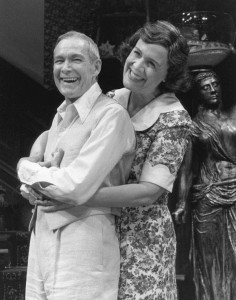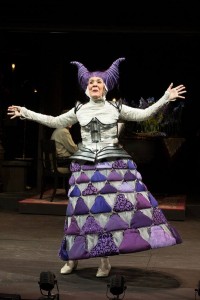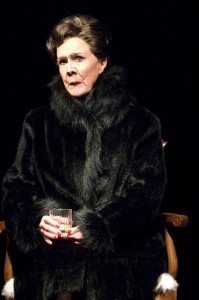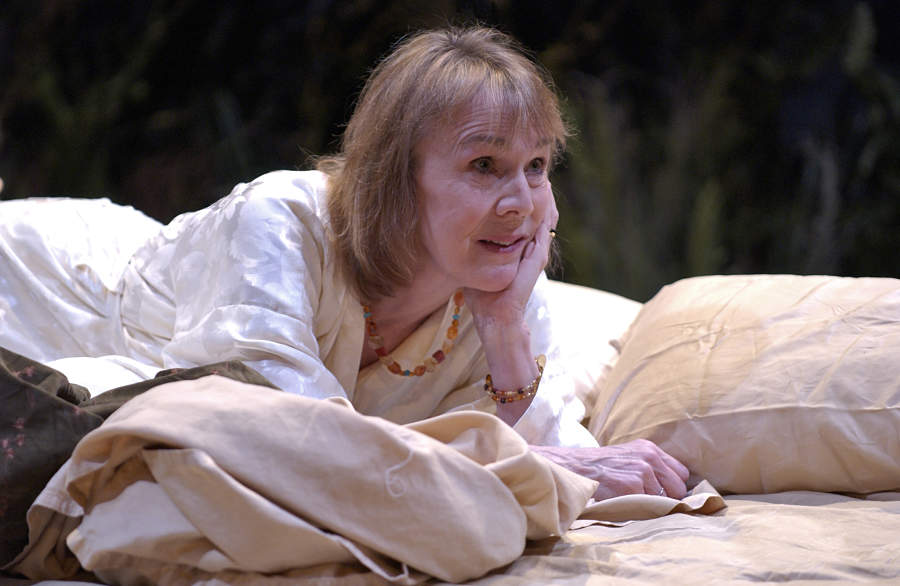She was cast as Sister Alice, a sweet, illness-plagued member of a Pentecostal sect of snake handlers in the rural South in Robert Schenkkan’s Handler. It was Bill’s first directing assignment at Oregon Shakespeare Festival, and both the project and his relationship with Catherine would change his life.
Between the two of us, we would direct her 10 times over the last 13 years, each of us five times. Chris particularly admired her brilliantly odd restraint as Mrs. Gottlieb in Sarah Ruhl’s Dead Man’s Cell Phone, her heartbreaking cris du coeur as Big Mama, and her wackadoodle energy as the cheerleading coach Mistress Quickly in The Very Merry Wives of Windsor, Iowa. Bill remembers the quirky way in which her Sister Alice adjusted her wig when she hoped the rest of the congregation wasn’t looking, and the smiles and love that her Lucetta gave with abandon to Julia in an Amish-set Two Gentlemen of Verona.
As a teenager, Catherine E. Coulson worked at Disneyland, where her father was in marketing. She attended Scripps College, then worked toward an MFA while helping to start a small radical theatre in San Francisco before landing in Los Angeles. She taught and worked at the American Film Institute and met an AFI fellow, David Lynch, working on his student film Eraserhead. She married that film’s star, Jack Nance, worked with John Cassavetes, and broke ground as a rare union camerawoman as her “day job” while continuing to act in plays, film and television. She went on to play the Log Lady in the cult TV series “Twin Peaks,” and throughout the rest of her life she would connect with fans by, in her words, “signing a lot of wood over the last 25 years.”

Catherine first came to Oregon Shakes to play Penelope Sycamore in You Can’t Take It With You in 1994, closely on the heels of her “Twin Peaks” fame. Her second husband became the rabbi at a local synagogue, and Catherine went on to perform for 22 consecutive seasons in Ashland, including a memorable turn as the Stepmother and Milky White the cow in last year’s Into The Woods, and her spirited work this season as General Matilda Cartwright in Guys & Dolls.
Over the intervening two decades at OSF, Catherine would tour to the Kennedy Center in the world premiere of Lillian Garrett-Groag’s The Magic Fire. After seeing her performance in Handler, playwright Robert Schenkkan was inspired to write an original two-hander for her and fellow OSF company member Armando Durán; Bill had the privilege of directing the result, By the Waters of Babylon. She also performed in many Shakespeares, a Sanskrit epic, musical comedies, and new and classic American dramas. She was an audience favorite, as her exuberant love for life burst through in every performance. In that core way in which, no matter how professionally accomplished we become, all of us theatre practitioners are just kids at play, you couldn’t help but smile when you saw Catherine Coulson onstage; she was a tall woman with a unique, bold physicality, and her love of acting was infectious.

There’s no doubt that Catherine was largely responsible for the two of us (and our two kids) moving to Ashland. Like hundreds of company members before and after us, she made us feel welcome in this community. She had an uncanny knack for making a personal connection built on shared humor and a few casually dropped nuggets of advice. Not only hundreds of colleagues, but thousands of audience members felt the same personal connection to Catherine’s one-woman quintessence of hospitality. She believed in and advocated for Bill as a potential artistic director at OSF, and she made us feel that Ashland really was a possible home for our family. She also bonded with us as fellow parents; her daughter Zoey painted an extensive Star Wars mural on the walls of our oldest son’s Ashland bedroom so that he would feel less scared about moving somewhere new.

Catherine was also a fierce caretaker of community, always with her ear to the ground for the grain of truth underneath the daily grumbles, always straining to see which individuals needed an extra word of encouragement. In fact, throughout her fight against cancer, she spent much of the last year of her life making sure that her community was coping with her illness with minimal upset and maximum joy and optimism.
It has been so painful to lose this community leader, this cherished colleague, and especially this close friend. For those of you who knew her—well, you know. For those of you who didn’t, just look into the spirited eyes of those of us who loved her as we talk about her. You’ll get a clear sense of what Catherine E. Coulson brought to our field and to the world.


